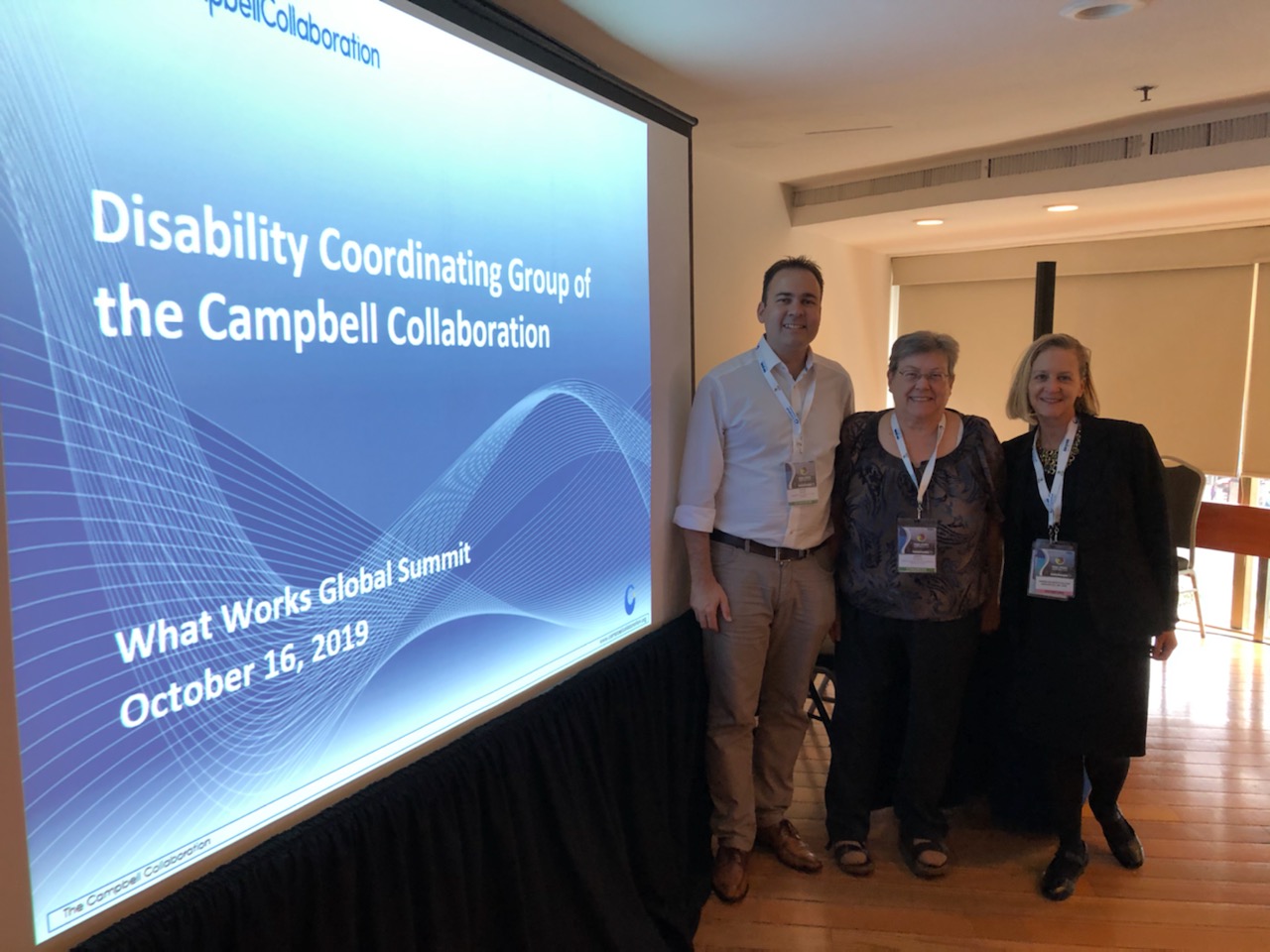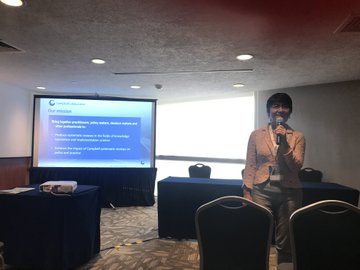Interested in Social Media?
Two of the NIDILRR-funded knowledge translation (KT) centers at the American Institutes for Research (AIR), the
Center on Knowledge Translation for Disability and Rehabilitation Research (KTDRR) and the Knowledge Translation
for Employment Research (KTER) Center, are hosting a two-part webcast series, focused on social media, for
National Institute on Disability, Independent Living, and Rehabilitation Research (NIDILRR) grantees.
The KTER Center will host “How Can Social Media Be Useful to You? (Or is Your Learning Network Fit for Purpose?)”
a webcast presented by Dr. Damien Roland, author of “Social
Media, Health Policy, and Knowledge Translation”. He will explore the barriers and facilitators of using social media as a KT strategy.
He will also discuss the limitations of using social media and opportunities to overcome them. Finally, Dr. Roland will explain how social
media can be useful to researchers as a KT strategy when carefully planned and evaluated.
The following week, Michelle Stergio will hold a live webcast, “Planning and Evaluating Your Social Media Strategy,” on behalf of the
Center on KTDRR. Ms. Stergio will present best practices on how to incorporate social media in your overall communications strategy
and how to evaluate its performance. NIDILRR grantees with active social media accounts will join her and share how they plan and
evaluate their social media strategies.
How can Social Media be Useful to You?: (Or is Your Learning Network Fit for Purpose?)
Tuesday, Dec. 3, 2019, at 3:00 p.m. Eastern Time
Planning and Evaluating Your Social Media Strategy
Tuesday, Dec. 10, 2019, at 3:00 p.m. Eastern time
Register Today!
Upcoming Webcast: Living Systematic Reviews
Living systematic reviews (LSRs) are updated on a regular schedule, rather than every few years. Not all systematic reviews need to be updated continuously, but some developing topics have new research emerging regularly, so reviews about these topics can benefit from ongoing updates. More than 200 researchers now participate in the Living Evidence Network (LEN), which is supported by Cochrane Australia. This informal network shares information about living systematic reviews, living guidelines, and the broader area of living evidence. In this free webcast, Dr. James Thomas, a member of the LEN steering group and deputy director of the Evidence for Policy and Practice Information and Co-ordinating Centre (EPPI-Centre), will guide viewers through the “why and how” of LSRs and will share the latest updates on this emerging synthesis strategy. As he is actively involved in developing new technologies and methods to support living systematic reviews, he will also summarize some of the latest developments in this area.
Date: Wednesday, January 15, 2020
Time: 2:00–3:00 p.m Eastern Time
Register for the webcast
Webcast information page:
https://ktdrr.org/training/webcasts/webcast72/index.html
NARRTC’s 2020 Annual Meeting and Conference
April 2–3, 2020
Make plans to participate in the next annual meeting and conference of NARRTC, the national association of NIDILRR grantees. The theme of NARRTC’s 42nd annual conference is Telling Our Story: Past, Present, and Future. Learn about cutting-edge research and knowledge translation activities and take advantage of networking opportunities with NIDILRR staff as well as new and experienced NIDILRR grantees.
Call for proposals is open (closes Nov. 22, 2019)
https://narrtc.org/wp-content/uploads/2019/10/2020-NARRTC-Conference-Call-for-proposals.pdf
Conference registration is open (please register by March 23, 2020)
https://web.cvent.com/event/12a7eb5b-475a-4db0-b30f-1534548bedc1/summary
Reserve a sleeping room (deadline is March 2, 2020)
https://book.passkey.com/event/49990839/owner/49759012/home
Date: April 2–3, 2020
Location: The Ritz-Carlton, Pentagon City
1250 South Hayes Street
Arlington, VA 22202
For more information visit the NARRTC website:
https://narrtc.org/annual-meeting/upcoming-meeting
Free Pre-Conference Workshop:
April 1, 2020
Learn about which strategies are best for sharing research information with state and national policymakers. “Outreach to Policymakers”
is co-sponsored by NARRTC, the Center on KTDRR, and the American Institutes for Research (AIR). This free pre-NARRTC conference
workshop for grantees funded by NIDILRR takes place on Wednesday afternoon, April 1, 2020, at the Embassy Suites by
Hilton Crystal City National Airport. Space allowing, we may invite non-NIDILRR-affiliated researchers.
Mark Bayer of Bayer Strategic Consulting will lead an all new, interactive, in-person workshop presenting proven and research-based strategies for networking and sharing research results with representatives on Capitol Hill and in grantees’ home states. Restrictions on lobbying will also be addressed.
A few weeks before the workshop, registrants will be invited to participate in a pre-workshop webcast to orient participants to the event and to address specific questions about meeting with policymakers. Webcast details will be sent to workshop registrants.
Date and time: April 1, 2020, 12:00–4:30 p.m. Eastern Time
12:00–12:30 p.m. (registration and refreshments)
12:30–4:30 p.m. (interactive workshop)
Location: Embassy Suites by Hilton Crystal City National Airport
1300 Richmond Highway (formerly Jefferson Davis Highway)
Arlington, VA 22202
Phone: 703-979-9799
Rooms are $251/night, and a free shuttle is available that stops at the Ritz-Carlton hotel/Pentagon City Metro.
Register for the free Pre-Conference Workshop
Center on KTDRR Staff Attend the
What Works Global Summit, Mexico City, Mexico

Photo of Oliver Wendt, Joann Starks, and Kathleen Murphy

Photo of Cindy Cai
Using funds from AIR that have been set aside to support the activities of the
Campbell Collaboration’s Disability Coordinating Group (DCG),
co-chair of the DCG and KTDRR training lead Joann Starks traveled to Mexico City, Mexico,
for the What Works Global Summit, sponsored by Center on KTDRR partner the Campbell Collaboration and
Mexico’s National Council for the Evaluation of Social Development Policy. She and DCG co-chair
Oliver Wendt gave a podium presentation updating attendees at the
Summit about the activities of the DCG. AIR’s Cindy Cai, who
performs quality assurance for the Center on KTDRR, also co-chairs the
Campbell Collaboration Knowledge
Translation and Implementation Coordinating Group and led a meeting of conference attendees interested in getting involved in that group.
KTDRR Director Kathleen Murphy also attended and on October 18 presented
the latest findings from the Center on Knowledge Translation for Employment Research Center’s (KTER Center) research in her presentation
“A Study of Knowledge Brokering in Vocational Rehabilitation Contexts.”
- The Center on KTDRR provides technical assistance (TA) to NIDILRR grantees who are authoring DCG systematic reviews.
- To learn more about the DCG, please contact Co-Chair Joann Starks at jstarks@air.org
KTDRR’s Expert Review Panel
Listening to our diverse stakeholders makes us better. Stakeholders help us to improve our products, broaden our perspectives, get our resources in the right hands, and increase their use. KTDRR has recently expanded its Expert Review Panel to include stakeholders from a wide array of areas, including knowledge translation, disability and rehabilitation research, systematic reviews and meta-analysis, accessibility, disability policy, cultural and linguistic competency, and targeted outreach to NIDILRR grantees. We need experts like you to help us achieve our goals. Help us go further by joining our Expert Review Panel by contacting Ann Outlaw today.
2019 Online KT Conference Overview
The Center on KTDRR hosted its 7th annual online KT conference on October 28, October 30, and November 1, 2019, with the help of a
global array of presenters.
This year’s theme was “Innovative Knowledge Translation Strategies That Work.” On the first day, the subtheme was “Setting the Stage for KT.” Julia Moore kicked things off with a highly interactive presentation about “Cutting Edge KT: Adaptations and Sustainability.” She was followed by NIDILRR grantees Susan Magasi and Shoma Webster, who outlined chief components of their curriculum model for building capacity in graduate students and consumers, which they call “Knowledge Translation Collaboratives.” The day ended with a panel offering a global perspective on disability policy, from Gordon Duff from the Disability Services Australia, coupled with Kathleen Mullen’s domestic perspective.
The second day’s subtheme was “Synthesis and Planning for Impact.” Piper Hansen described uptake of the Canadian Occupational Performance Measure in stroke rehabilitation. She was followed by Seeta Ramdass’ innovative exploration of “Misinterpretation, Misunderstanding and Misdiagnosis,” a script dramatizing common communication failures that can occur in approaches to healthcare delivery. The day finished up with a panel that included three speakers. First, Howard White introduced the audience to evidence and gap mapping, then Katy Sutcliffe highlighted challenges to systematic reviews for complex questions and contexts, and finally Francesca Gimigliano announced the upcoming Cochrane Collaboration Rehabilitation e-book project.
“Innovative Dissemination Strategies and Tools” was the third and final day’s subtheme. Jon McKenzie illustrated several examples of transmedia KT, from raps to Pecha Kuchas. Lisa Lachance outlined strategies for engaging stakeholders from community-based organizations. The conference closed with an examination of NIDILRR grantees’ use of infocomics, with perspectives from Silas James, Wendy Strobel-Gower, and Janet Walker with Mary Beth Welch.
Check out the Expo to download presenter slides. And save the date! for the 2020 Online KT Conference, taking place the week of October 26, 2020. We’ll be all about social media.
|





